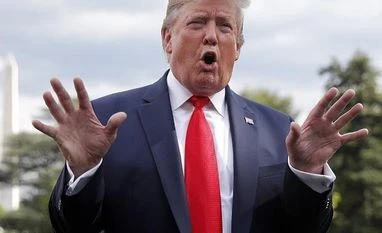President Donald Trump's impeachment acquittal has delivered the White House a fresh coat of power, sparking worries over the rise of an "imperial presidency." His victory in the Senate trial on Wednesday accelerated a decades-long shift in the US government in which Congress has steadily ceded authority to the Oval Office.
The presidency hit a low in the 1970s, after Congress wrested authority away following Richard Nixon's Watergate abuses.
Since then, each successive US leader has sought to further dominate the legislature.
Trump, though, has sparked anxiety: he flaunts his power, and has an attorney general who favors a strong presidency and a Republican Party unwilling to restrain him.
One of his impeachment lawyers claimed Trump is free to do whatever he wants -- even cheat in elections -- if he believes it is in the national interest.
Trump himself says, citing the US Constitution: "I have the right to do whatever I want as president." "It is now arguable... that Donald Trump may well have become the most powerful president in American history," historian Jon Meacham said after Trump's trial closed.
"President Trump is functionally a monarch at this point. If the king does it, it's okay." After suffering under the British king, the architects of the US system of government crafted a constitution in 1789 that gave the legislature strong checks on the powers of the new nation's chief executive.
Lawmakers held the upper hand mostly through the early 20th century, until, faced by existential emergencies -- the Great Depression and then World war II -- president Franklin Roosevelt rode roughshod over Congress to take action.
Since then, "we have seen a steady increase over time in the independent powers of the presidency," said Mark Rozell, dean of the Schar School of Policy and Government at George Mason University.
"Presidents are encouraged, I think, to grab as much power and make as much of a difference during their one or two terms as they can." "This is not just a Republican thing. It's presidents of both parties," said Rozell.
Executive power got a considerable boost with the September 11, 2001 terror attacks.
Republican George W. Bush went far beyond his statutory authorities to order actions like secret surveillance of Americans and abduction and torture of foreign fighters, claiming he had the right to do so to protect the country.
Congress did require him to obtain approval to make war on Al-Qaeda and Iraq. But they gave him broad authority, allowing the "War on Terror" to extend to Syria, Yemen and Africa under Bush and his successors.
Nearly two decades later, Congress worries that Trump could use the same powers to go to war with Iran. But the lawmakers are too at odds to do anything about it.
Barack Obama entered the White House in 2009 pledging not to abuse his powers like Bush and to respect Congress's equal authority. But within a couple years, faced by Congressional Republicans determined to stymie anything Obama wanted, he declared his "We Can't Wait" initiative and began leading by executive order.
Obama used his executive powers for environmental rules, protection for undocumented immigrants, gun control and a higher minimum wage.
Having criticized Bush for abusing his war powers, Obama personally signed off on scores of secret drone attacks on terror targets, until even he admitted that there was need for a formal review process. He created a number of administrative bodies led by powerful "czars" that could institute regulations without going through Congress, and made top-level appointments when Congress was in recess to avoid a contentious approval process.
When in 2014 the Republican House leader threatened a court challenge, Obama quipped: "So sue me." Trump branded Obama's use of executive orders as "power grabs." But he now taps that authority far more brashly.
He skips Congress to appoint senior officials by designating them "acting"; he declared a "national emergency" to divert billions of dollars of Pentagon money to build a border wall; and he cited national security to effectively ban Muslims from entering the country. He has lost numerous court challenges but has also prevailed -- most notably in defying subpoenas from Congress during his impeachment. Experts say that success shows the legislature forfeiting one of its key powers to check the executive.
If Trump's claims of near-unlimited authority go unaddressed, it "will permanently and dangerously alter the balance of power" in the government, said Democrat Adam Schiff, who led the impeachment probe.
Others say Trump merely uses his powers more cockily, and that impeachment drew a line for the imperial presidency.
New York University law professor Richard Pildes says who wins the November 2020 election -- Trump and his Republicans or the Democrats -- will be indicative.
"How these events become absorbed politically in the next election will significantly shape what future presidents and members of Congress come to think about the exercise of their powers," Pildes said.
Unlock 30+ premium stories daily hand-picked by our editors, across devices on browser and app.
Pick your 5 favourite companies, get a daily email with all news updates on them.
Full access to our intuitive epaper - clip, save, share articles from any device; newspaper archives from 2006.
Preferential invites to Business Standard events.
Curated newsletters on markets, personal finance, policy & politics, start-ups, technology, and more.
)